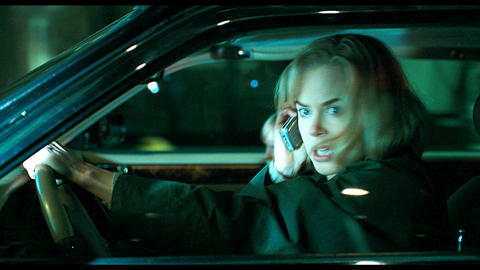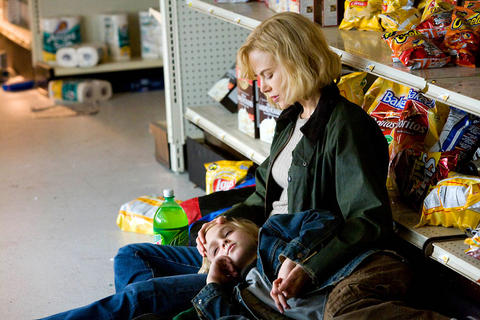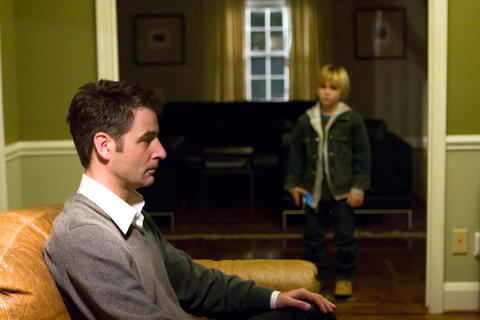The Nicole Kidman thriller is the fourth film version of the alien-paranoia classic Invasion of the Body Snatchers - previously filmed in 1956, 1978, and 1993 - and to understand its problems, you have to know some Hollywood back story.
Written by hot young screenwriter David Kajganich and directed by German filmmaker Oliver Hirschbiegel (who made the 2004 Hitler's-last-days movie Downfall), The Invasion was filmed in 2005. Producer Joel Silver, that purveyor of commercially successful wham-bam, decided Hirschbiegel's cut didn't work and put it on the shelf for a year, ultimately bringing in the Wachowski brothers (The Matrix) to dream up some action scenes and James McTeigue (V for Vendetta) to reshoot them last fall.
Memo to Silver: This never works. It never has. Get it through your head - trusting the original vision is always the better idea. As an example of creative (or desperate) editing meant to salvage a compromised project, The Invasion is a fascinating object lesson. As a sci-fi thriller, sadly, it's a mess.

PHOTO: COURTESY OF WARNER BROTHERS
From what I can tell, Hirschbiegel and Kajganich's original had two great notions. The first is that Kidman already seems like an alien replicate. The Invasion is set in Washington, DC, where Carol Bennell (Kidman) is a psychiatrist and single mom with a young son named Oliver (Jackson Bond). The action kicks in seconds after the opening credits with the unexpected crash landing of the space shuttle bearing alien spores. Within hours - or days, or weeks; it's hard to tell - people start behaving oddly, emotionlessly. They're no longer who they were, but part of an eerie hive mind.
The gimmick is that Kidman's heroine starts the film as a cool, maternal zombie - never has the actress more resembled a porcelain doll - only to fall apart and become a stressed-out human as the virus takes root in the population. She has to lose control to remember she has a soul. There are no pods this time; as Carol's ex-husband (Jeremy Northam) demonstrates, the spores are passed from person to person in an icky spew of green bile. Then you go to sleep, your DNA is re-engineered, and you wake up part of an alien ant colony.
The movie's other brilliantly perverse idea: this might not be such a bad thing. In shards of overheard news footage, we realize that peace is breaking out all over the planet: Iraq, Israel, North Korea. Why fight when we're all one big organism anyway? Is individuality a fair trade for global harmony? As The Invasion hurtles forward, fraying at the seams, the audience is put in the extremely odd position of rooting for both the humans and the aliens.

PHOTO: COURTESY OF WARNER BROTHERS
That's the intent. At least, I think it is. There are two movies here, and the more simplistic one ends up in charge. Carol's friend and brooding love interest, a doctor named Ben (Daniel Craig), gets a fair amount of business, but other characters have been thwacked back to brief appearances: Josef Sommer and Celia Weston get one good scene as Ben's aging Eastern European friends, the Belicecs, as does Roger Rees, playing a cynical Russian diplomat. The gifted Jeffrey Wright is handed chunks of exposition as a lab researcher, then hustled off-screen.
Also present is Veronica Cartwright - nice to know she survived the 1978 version - as one of Carol's patients. Her failure to go alien on schedule tilts The Invasion into an increasingly preposterous final 30 minutes, where characters hastily theorize about immunities and embark on long, frenetic car chases. The spectacularly eerie vibe the earlier scenes have built up, almost in spite of themselves, dies in a din of crushed fenders and gunshots. The film's rewritten ending is - there's no other word for it - pathetic, a laughable attempt to patch closure onto a nightmare. Is the irony intended? Are we supposed to mourn the serene, dull alien Earth that almost is? By now, the storytelling is much too confused to tell.
In the way that certain baseball games become pitchers' duels, some movies are cutting-room battles. The credited editors on The Invasion are Hans Funck and Joel Negron; the first cut Downfall, the second movies like Man of the House and The Texas Chainsaw Massacre: The Beginning. One is Hirschbiegel's man, the other Joel Silver's. At times, you can actually see their two versions of the film wrestling, as scenes leap forward in time and then suddenly jump back.

PHOTO: COURTESY OF WARNER BROTHERS
At other moments, you sense the stately, almost monochromatic dread of Funck's cut between the sutures of meat-and-potatoes suspense, the nip-and-tuck of the hired plastic surgeon. Who knows what this movie could have been? The Invasion died on the operating-room table, and we're just watching the wake.

Behind a car repair business on a nondescript Thai street are the cherished pets of a rising TikTok animal influencer: two lions and a 200-kilogram lion-tiger hybrid called “Big George.” Lion ownership is legal in Thailand, and Tharnuwarht Plengkemratch is an enthusiastic advocate, posting updates on his feline companions to nearly three million followers. “They’re playful and affectionate, just like dogs or cats,” he said from inside their cage complex at his home in the northern city of Chiang Mai. Thailand’s captive lion population has exploded in recent years, with nearly 500 registered in zoos, breeding farms, petting cafes and homes. Experts warn the

The unexpected collapse of the recall campaigns is being viewed through many lenses, most of them skewed and self-absorbed. The international media unsurprisingly focuses on what they perceive as the message that Taiwanese voters were sending in the failure of the mass recall, especially to China, the US and to friendly Western nations. This made some sense prior to early last month. One of the main arguments used by recall campaigners for recalling Chinese Nationalist Party (KMT) lawmakers was that they were too pro-China, and by extension not to be trusted with defending the nation. Also by extension, that argument could be

Aug. 4 to Aug. 10 When Coca-Cola finally pushed its way into Taiwan’s market in 1968, it allegedly vowed to wipe out its major domestic rival Hey Song within five years. But Hey Song, which began as a manual operation in a family cow shed in 1925, had proven its resilience, surviving numerous setbacks — including the loss of autonomy and nearly all its assets due to the Japanese colonial government’s wartime economic policy. By the 1960s, Hey Song had risen to the top of Taiwan’s beverage industry. This success was driven not only by president Chang Wen-chi’s

Last week, on the heels of the recall election that turned out so badly for Taiwan, came the news that US President Donald Trump had blocked the transit of President William Lai (賴清德) through the US on his way to Latin America. A few days later the international media reported that in June a scheduled visit by Minister of National Defense Wellington Koo (顧立雄) for high level meetings was canceled by the US after China’s President Xi Jinping (習近平) asked Trump to curb US engagement with Taiwan during a June phone call. The cancellation of Lai’s transit was a gaudy